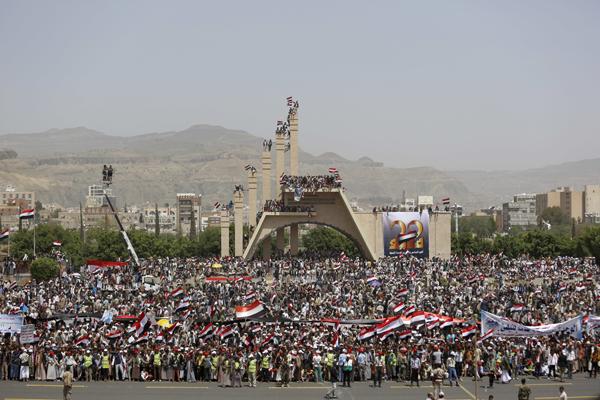You are here
UN envoy cites progress in Yemen talks, air strikes continue
By AP - May 22,2016 - Last updated at May 22,2016

People attend a ceremony to commemorate the 26th anniversary of Yemen’s reunification in Sanaa, Yemen, on Sunday (AP photo)
DOHA, Qatar — Fragile peace talks aimed at ending fighting in Yemen are making progress as a truce largely holds, the UN envoy for the country asserted Sunday after the impoverished Arab nation’s government agreed to return to the negotiating table.
The Yemeni government last week announced it was suspending talks being held in Kuwait with Shiite rebels, accusing them of refusing to accept the legitimacy of the country’s internationally recognised president.
During a Saturday meeting in the Qatari capital, Doha, with UN Secretary-General Ban Ki-moon and the emir of Qatar, Yemeni President Abed Rabbo Mansour Hadi agreed to send the government delegation back to the talks, according to a UN statement.
But inside Yemen, a fresh round of Saudi-led airstrikes hit the capital, Sanaa. Military bases on the outskirts of the city were hit in the first such strikes in a month, witnesses and military officials said. They spoke on condition of anonymity as they feared repercussions or were not authorised to brief the media.
The former president Ali Abdullah Saleh, a heavyweight inside the rebel movement, renewed his rejection of Hadi’s legitimacy and called the talks a “waste of time”.
A truce between the warring parties that began April 10 has largely held despite violations by both sides. Speaking at the Doha Forum conference on Sunday, UN envoy to Yemen Ismail Ould Cheikh Ahmed said that the drop in violence has been crucial in ensuring much-needed aid can make its way to areas affected by the fighting.
“The cessation of hostilities is holding around 80 to 90 per cent,” he said, even as he acknowledged that pockets of violence continue. “The people of Yemen feel there is a cessation of hostilities.”
The fighting in Yemen pits Shiite rebels known as Houthis and supporters of a former president against Yemen’s internationally recognised government. The Houthis seized the capital, Sanaa, in September 2014, forcing Hadi to flee to Saudi Arabia.
A Saudi-led military coalition that includes Qatar launched a large-scale air strike campaign in March 2015 and later began on-the-ground military operations to retake rebel positions. The coalition has had success in driving the rebels out of some southern cities but has so far been unable to dislodge them from the capital and their stronghold in the north.
In the chaos, Al Qaeda forces have managed to make inroads and seize territory of its own. In Hadramawt province, Governor Ahmed Ben-Brik said in a statement Sunday that the army and coalition forces killed 13 Al Qaeda troops in operations, without giving further details.
The peace talks are aimed at ending the conflict based on a UN Security Council resolution that calls for militias to withdraw from all cities, hand over weapons, and release political detainees.
The UN envoy expressed hope that most of the thorniest issues in the conflict have been discussed during the Kuwait talks.
“We are not at square zero... We are in fact making incredible progress,” Ahmed said when asked during the forum about the slow pace of the negotiations. He expressed hope that a resolution to the conflict is “very close”, though he was quick to add a note of caution.
“I cannot guarantee you an outcome. You can be very close, but then because of the position of the parties they may fail,” he said.
Related Articles
UNITED NATIONS — The UN envoy for Yemen on Tuesday presented a proposal to the Houthi rebels and their allies on advancing prospects for pea
ADEN — Yemeni pro-government forces on Thursday seized a town overlooking the besieged city of Taez after weeks of deadly fighting with Iran
UNITED NATIONS, United States — The UN Security Council on Monday expressed full support for the UN envoy for Yemen after he came under shar
















